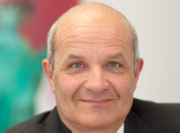In the United States, Swiss Made is increasingly attracting more consumers and companies. The head of the Swiss-US Chamber of Commerce sheds light on Swiss SMEs wishing to break into this market.
With a turnover of CHF 68.8 billion in 2020, the United States is Switzerland's second-largest export market after Germany and is a promising destination for Swiss products. This is a strong trend that should continue, explains Martin Naville, Director General of the Swiss-American Chamber of Commerce.
How do you explain the success of Swiss products in North America, and more specifically, in the United States?
Martin Naville: When I took up my post in 2004, Germany accounted for 26% of our exports and the USA, like France and Italy, accounted for 9%. In the first three quarters of 2021, the US has overtaken Germany and this market alone is now larger than France, Italy, Great Britain and Austria combined. There are several reasons for this success. Firstly, Swiss companies understood 20 years ago that the European Union would not be an Eldorado forever and anticipated it accordingly: the EU still absorbs half of our exports today and remains a major market, but its relative share is declining. It was, therefore, important to intensify our presence in other areas such as Asia and the United States. Secondly, we can rely on long-standing precedence: Roche, Nestlé, Lindt and Swiss Re (which covered half the damages caused by the San Francisco earthquake in 1906) are some of the major Swiss companies that established themselves very early in North America and invested heavily there, before the Germans, the French or the British. This historic trend has further intensified over the past 20 years to the point where Switzerland is now the sixth-largest direct investor in North America, on a par with Germany. This long-term presence on American soil has enabled us to accumulate essential experience in a market that, although admittedly complex, is certainly open and growing.
Has the pandemic compromised this long-term trend?
Naville: The decline has remained cyclical and limited. In 2020, our exports to the EU fell by 6%, compared with only 2.5% to the United States, and the rebound in the first three quarters of 2021 was much stronger in the US market than in the European or Chinese markets.
From an American perspective, what are Switzerland’s main advantages?
Naville: That depends on the sector, but the reputation of seriousness and credibility associated with Swiss Made is a good calling card when it comes to getting a first meeting. The effects, however, should not be overestimated. While this is a positive image, it remains a conventional one, and is not a guarantee of success; for many Americans, Switzerland is still synonymous with chocolate, watches and mountain pastures. Displaying the Swiss flag is therefore not enough. The American market is the equivalent of the Champions League: to be competitive there requires time, money and total personal commitment from the CEO. It's the biggest market in the world, but it's also the one where everyone wants to go, with customers who haven’t waited for us to find answers to their needs.
What is most challenging for a Swiss company seeking to expand into the US market?
Naville: The speed with which you can make contacts is appealing because it doesn't take weeks to set up a meeting, but it can also be surprising because the meeting will last 10 minutes, which means you have to get straight to the point. The importance of the legal aspect is another obvious difference. Whereas in Switzerland a two-page agreement is sufficient, in the US, each contract is subject to scrutiny by specialist lawyers. The weight that litigation can take on is a real American trait: whatever you sell and whatever the quality of your work, appeals by competitors are part of the game, if only to slow you down. But the biggest danger is to assume that you can easily understand the American market when there are huge cultural differences. The metric system does not apply, consumer expectations are different... Speaking English is not enough to do business – far from it. What has made Swiss companies successful over the past 20 years is precisely their ability to take into account these cultural differences.
In which areas do Swiss companies perform best?
Naville: Pharma still accounts for almost 50% of export volume and Switzerland continues to export mainly chemicals, precision instruments, watches, machinery and electronics, but Swiss companies are present in all sectors, without always being aware of the success of certain SMEs. All Starbucks use Thermoplan coffee machines, NASA's Mars rover runs on engines from Maxon Motors, rocket caps are made by Ruag... Switzerland is everywhere, in B2B and B2C.
There is no free trade agreement between Switzerland and the USA. Is this an obstacle for Swiss companies and is such an agreement conceivable?
Naville: In the short term, the outlook remains bleak: Joe Biden’s Democratic administration, unlike the previous one, is not in favour of free trade. Discussions had, in fact, been initiated during Donald Trump’s term, as he was more favourable to this type of agreement as shown by the renegotiation of NAFTA between the United States, Mexico and Canada. But Switzerland was not a priority, which is not necessarily a problem: our economic relations with the US are based more on the importance of investments by Swiss companies, and the doubling of our export volume in 20 years has taken place under both Republican and Democratic administrations. As long as the EU does not conclude an equivalent agreement on its side, the question of a free trade treaty remains relatively secondary.






